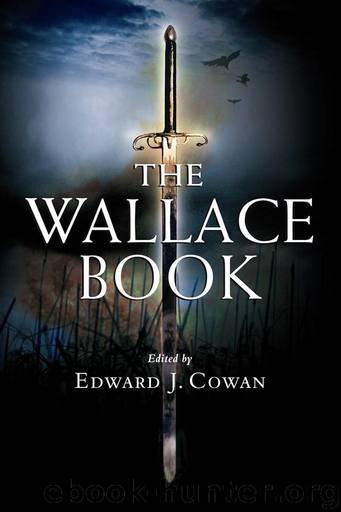The Wallace Book by Edward Cowan

Author:Edward Cowan
Language: eng
Format: mobi, epub
ISBN: 9780857904942
Publisher: Birlinn
Published: 0101-01-01T00:00:00+00:00
9
The English Cult of Wallace and the Blending of Nineteenth-Century Britain
Colin Kidd
In today’s Scotland most invocations of the name of William Wallace are directed towards nationalist ends or, at the very least, towards unambiguously Scottish causes. As often as not, appeals to the national memory of Wallace and his achievements carry with them an anglophobic resonance. While Scots celebrate Wallace as a nationalist icon, they remember him quite specifically as an uncompromising foe of English imperial pretension. To their credit, Scottish historians have questioned the historical longevity of this nationalist pedigree. In particular, they have shown that, while for most of Scotland’s history, Scots have considered Wallace an emblem of national freedom, things were very different during the nineteenth century when Wallace became identified with a particular interpretation of the Union. ‘Unionist-nationalism’, in Graeme Morton’s catchy formulation, involved a strict construction of the Union – the notion that Scotland and England were equal partners in a common enterprise freely entered into by sovereign nations in 1707. Unionist-nationalists read into Scotland’s medieval War of Independence the lesson that England had never succeeded in conquering Scotland; amalgamation had come about centuries after the War of Independence only through negotiated union. Thus, commemorations of the deeds of Wallace and Bruce served as a reminder to an oblivious England that the Union was an association of sovereign equals. However, the nineteenth-century Scottish cult of Wallace, which led to the construction of various Wallace statues and towers, including the National Monument on the Abbey Craig, near Stirling, was predicated not only on denial that Scotland was a mere province of England but also on an acceptance by Scots of the Union of 1707. Wallace’s nationalist significance was sublimated in a deeper unionism. For mid-nineteenth-century unionistnationalists ultimately did nothing to challenge the legitimacy of the United Kingdom and a common British parliament.1
‘Unionist-nationalism’, however, while an adequate description of some manifestations of the Wallace cult during the nineteenth century, does not quite capture the texture of Anglo-Scottish relations during this period, nor some of the more surprising features of the Wallace phenomenon. For example, Wallace’s name did not only serve to forward unionist-nationalist causes; Wallace was also pressed into the service of outright anglicisation. The Shade of Wallace is a poem that argues the Anglo-British case for importing into Scots law the English form of civil jury.2 Rather than enlisting Wallace’s patronage in defence of Scots legal distinctiveness, as might be expected in this instance, the anonymous poet deploys Wallace, somewhat misleadingly, for the anglicisation of the Scottish legal system. The poet claims, however, that medieval Scotland, like her southern neighbour, had in fact enjoyed the benefits of civil jury as part of its Gothic constitution until James V introduced the illiberal Franco-Roman College of Justice:
Juries, that shall with truth decide,
Will o’er the Tweed in triumph glide,
Transmitted down, Old England’s pride,
From Saxon times,
Across the mountains stride
To Northern climes.
Shall not a wise judicious race
This glorious privilege embrace
That once did Caledonia grace
Shone bright as moon
Till James the Fifth did quite deface
The heavenly boon.
Download
This site does not store any files on its server. We only index and link to content provided by other sites. Please contact the content providers to delete copyright contents if any and email us, we'll remove relevant links or contents immediately.
| General | Channel Islands |
| England | Northern Ireland |
| Scotland | Wales |
Room 212 by Kate Stewart(5090)
The Crown by Robert Lacey(4785)
Endurance: Shackleton's Incredible Voyage by Alfred Lansing(4743)
The Iron Duke by The Iron Duke(4335)
The Rape of Nanking by Iris Chang(4189)
Joan of Arc by Mary Gordon(4079)
Killing England by Bill O'Reilly(3986)
Say Nothing by Patrick Radden Keefe(3964)
I'll Give You the Sun by Jandy Nelson(3415)
Shadow of Night by Deborah Harkness(3340)
Hitler's Monsters by Eric Kurlander(3317)
Mary, Queen of Scots, and the Murder of Lord Darnley by Alison Weir(3188)
Blood and Sand by Alex Von Tunzelmann(3180)
Eleanor & Park by Rainbow Rowell(3139)
Darkest Hour by Anthony McCarten(3112)
Margaret Thatcher: The Autobiography by Thatcher Margaret(3065)
Book of Life by Deborah Harkness(2913)
Red Famine: Stalin's War on Ukraine by Anne Applebaum(2908)
The One Memory of Flora Banks by Emily Barr(2846)
